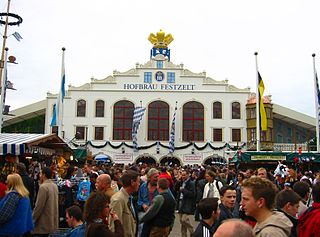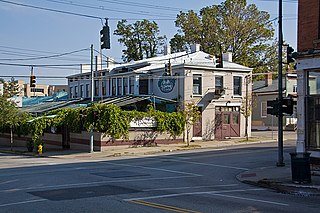 W
WA beer garden is an outdoor area in which beer and food are served, typically at shared tables.
 W
WA beer hall is a large pub that specializes in beer.
 W
WBeer stein, or simply stein, is an English term for either traditional beer mugs made out of stoneware, or specifically ornamental beer mugs that are usually sold as souvenirs or collectibles. An 1894 article on beer mugs in the American Vogue magazine describes various types of steins adding ″And it is to this [i.e. German] nation that we owe Wagner's music and the apotheosis of the beer mug."
 W
WBeer Stein Markers were puppets of knitted wool used by Bavarian beer drinkers to clearly identify their tankards when sent back for refilling. The puppets were usually about 10cm high and fixed to the thumbpiece on the lid. Traditionally they were caricatures of politicians of the time, both popular and unpopular. The custom was particularly to be seen at the Löwenbräukeller in Munich during the 1890s.
 W
WSister Doris Engelhard is a Catholic nun and Bavarian brewmaster. Engelhard brews her beer in the Mallersdorf Abbey, and feels that "brewing is her way of serving God." Engelhard is the last nun working in Europe as a brewmaster.
 W
WThe Hirschgarten, formally the Königlicher Hirschgarten, is a restaurant in Munich. The restaurant is noted for its beer garden, which is the largest in Munich and probably the largest in the world. It has seating for over 8000 people.
 W
WThe Hofbräu-Festzelt is one of the largest beer tents of the Oktoberfest in Munich owned by Tony Stephenson-Gromer, Germany.
 W
WThe Hofbräuhaus am Platzl is a beer hall in Munich, Bavaria, Germany, originally built in 1589 by Bavarian Duke Maximilian I as an extension of the Staatliches Hofbräuhaus in München brewery. The general public was admitted in 1828 by Ludwig I. The building was completely remodeled in 1897 by Max Littmann when the brewery moved to the suburbs. All of the rooms except the historic beer hall ("Schwemme") were destroyed in the World War II bombings. The reopening of the Festival Hall in 1958 marked the end of the post-war restoration work.
 W
WMaß or Mass is the German word describing the amount of beer in a regulation mug, in modern times exactly 1 litre (33.8 US fl oz). The same word is also often used as an abbreviation for Maßkrug, the handled drinking vessel containing it, ubiquitous in Bavarian beer gardens and beer halls, and a staple of Oktoberfest. This vessel is often referred to as a beer mug by English speakers, and can be correctly called a beer stein only if it's made of stoneware and capable of holding a regulation Maß of beer.
 W
WMecklenburg's Garden is a historic restaurant in the Corryville neighborhood of Cincinnati, Ohio, United States. Its Italianate building, perhaps constructed as a house, was built circa 1865, but it was converted into a restaurant by 1870. In its earliest years as a restaurant, it was run by John Neeb, who sold it to one of his employees in 1886. The new owner, Louis Mecklenburg, changed the name from "Mount Auburn Garden Restaurant" to "Mecklenburg's Garden," and converted it from a saloon to a heavily German beer garden. During this time, Cincinnati was receiving massive numbers of German immigrants; with as much as 25% of the city's population being German-born, cultural institutions such as beer gardens were extremely popular.
 W
WThe Reinheitsgebot is a series of regulations limiting the ingredients in beer in Germany and the states of the former Holy Roman Empire. The best known version of the law was adopted in Bavaria in 1516, but similar regulations predate the Bavarian order, and modern regulations also significantly differ from the 1516 Bavarian version. Although today, the Reinheitsgebot is mentioned in various texts about the history of beer, historically it was only applied in the duchy of Bavaria and from 1906 in Germany as a whole, and it had little or no impact in other countries or regions.
 W
WSchlenkerla is a historic brewpub in Bamberg, Franconia, Germany renowned for its smoked Aecht Schlenkerla Rauchbier.
 W
WA Stammtisch is an informal group meeting held on a regular basis, and also the usually large, often round table around which the group meets. A Stammtisch is not a structured meeting, but rather a friendly get-together.